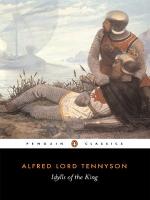|
This section contains 6,401 words (approx. 22 pages at 300 words per page) |

|
SOURCE: "The Moral Paradox of the Hero in Idylls of the King," in ELH, Vol. 30, No. 1, March, 1963, pp. 53-69.
In the following essay, the critic describes the Idylls as a pessimistic picture of the self's moral relationship with the world.
For Tennyson, as for other modern thinkers, the starting-point of all philosophy lies in the reality of self. As C. F. G. Masterman, in his much neglected book on Tennyson's religious thought, has shown, the self for Tennyson "is the one and only thing of which by direct conviction we can assert reality."1 Yet, the question remains, how is the self to be apprehended? This problem of identity is, I believe, central in Tennyson's poetry, and indeed it may justly be said that the great body of his poetry is directed towards answering the question. In this essay I should like to suggest, by first briefly examining some...
|
This section contains 6,401 words (approx. 22 pages at 300 words per page) |

|


